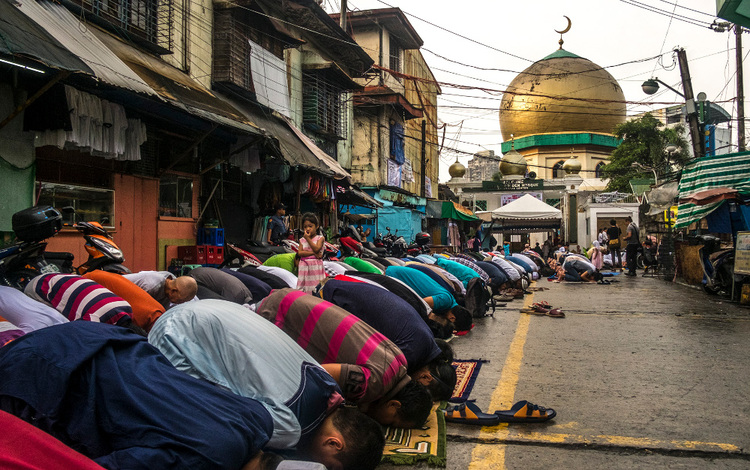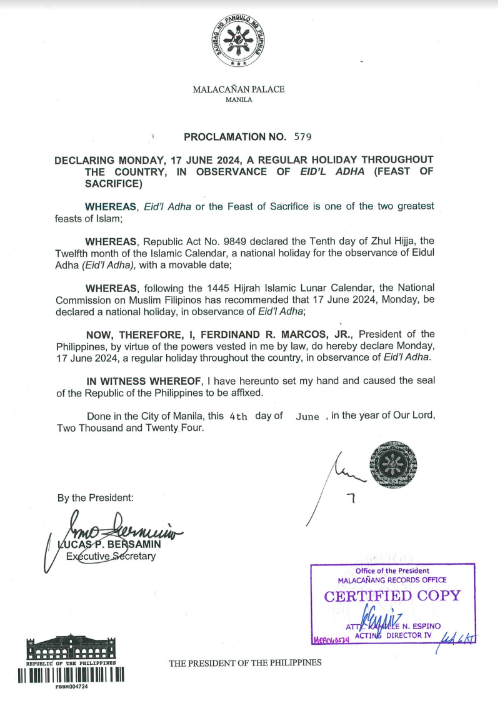In a move to honor one of the most significant Islamic celebrations, President Ferdinand Marcos Jr. has declared June 17, 2024, a regular holiday throughout the Philippines. This decision, aimed at enabling the nation to observe Eid’l Adha or the Feast of Sacrifice, was formalized through Proclamation No. 579, which was signed by Executive Secretary Lucas Bersamin on June 4, 2024.

Millions of Muslims around the world will gather to mark one of the holiest days in the religious calendar.
Large groups get together to pray while enjoying feasts and wearing their best clothing. The celebration revolves around when Allah appeared to Ibrahim in a dream and asked him to sacrifice his son, Ishmael, as a sign of his faith.
It’s similar to the Christian and Jewish stories in which God asked Abraham to sacrifice his son Isaac but spared him from doing so. Luis Liwanag/Benarnews
Eid’l Adha, one of the two greatest feasts in Islam, commemorates the willingness of Ibrahim (Abraham) to sacrifice his son in obedience to Allah. This act of devotion and faith is celebrated by Muslims worldwide through prayers, feasts, and acts of charity. In the Philippines, where a significant Muslim population resides, the observance of Eid’l Adha is a momentous occasion, marked by communal prayers and festive gatherings.
The proclamation was made upon the recommendation of the National Commission on Muslim Filipinos (NCMF). The NCMF based its suggestion on the 1445 Hijrah Islamic Lunar Calendar, ensuring that the holiday aligns with the global Islamic community’s observance of Eid’l Adha.
Under Republic Act No. 9849, the 10th day of Zhul Hijja, the 12th month of the Islamic Calendar, is designated as a national holiday for the observance of Eid’l Adha. The date of this holiday is movable, as it follows the lunar calendar, which differs from the Gregorian calendar used in the Philippines.
President Marcos emphasized the importance of recognizing and respecting the diverse cultural and religious practices within the country. By declaring June 17 a regular holiday, the government acknowledges the significance of Eid’l Adha for the Muslim community and promotes a spirit of inclusivity and unity among Filipinos of different faiths.
The declaration means that schools, government offices, and many businesses will be closed, allowing Muslims and non-Muslims alike the opportunity to participate in or observe the festivities. It is a day for reflection on the values of sacrifice, charity, and faith, which are central to the celebration of Eid’l Adha.

As the nation prepares for this holiday, various local governments and community leaders are expected to organize events and activities highlighting the cultural heritage and traditions associated with Eid’l Adha. These events will not only serve to educate the broader population about Islamic practices but also foster greater understanding and harmony among the diverse cultural groups in the Philippines.
The proclamation of June 17 as a regular holiday for Eid’l Adha underscores the Philippine government’s commitment to honoring the country’s rich cultural and religious diversity. It allows all Filipinos to celebrate and appreciate the values of sacrifice, devotion, and community that Eid’l Adha represents.
